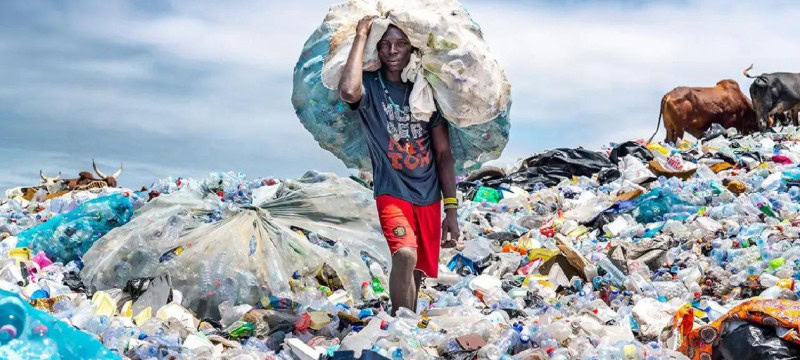Production of plastic waste worldwide increased by two-thirds to 460 million tonnes between 2009 and 2019 and is expected to triple by 2060.
We may have plenty of time for analogies because it only takes these shopping bags 1,000 years to decompose, which should stress the severity of the issue. If stacked, these bags would travel 5,790 times to and from the moon.
Read more : 5 Pakistani Actresses Who Would Make Excellent Barbie Dolls in a Pakistani World
Despite the enormous claims made by the world community and major plastic companies, only 9% of waste gets recycled, and the majority of it is apparently shipped to impoverished Asian nations with the label “recycled” before ending up in a landfill in a rich country.
Therefore, the problem statement is not new, and this has led to the creation of a number of climate tech businesses that are striving to develop a recycling model that can be both sustainable and scalable in addition to actually recycling plastic garbage.
Describe Concept Loop.
Dabeer Hemani, co-founder of Concept Loop, said exclusively to ProPakistani, “We have been working in the field of sustainable building materials for about ten years, but we recently understood how plastic trash can be transformed into a one-of-a-kind opportunity.
He claimed that because recycled plastic is used to make partition boards, decorative sheets, and paver blocks for walkways and walk-in areas, Concept Loop is working to find solutions to both the problem of plastic waste and the rapid degradation of traditional building materials
It is largely concentrating on the circularity of ‘non-recyclable’ low-value multi-layer plastics and others. In the long run, it can help communities that are exposed to and residing near dumping grounds where the garbage is burned, but it can also help the invisible and unregulated sector that gathers and sorts the waste by giving them work.
By the end of the year, Concept Loop hopes to increase the statistics to 170,000 kg and 589,000 kg, respectively, from the current 20,000 kg of plastic that it claims to have countered with 69,000 kg of environmental savings.
But it’s not so easy to build up a viable plastic recycling system in a developing nation. Since they haven’t stated the cost, we don’t know whether or when this technology will be made commercially available or how practical it will be. While additional goods like divider boards and ornamental sheets are also in various phases of development, the company is now working on paver blocks used for pathways and parking spaces with plans to exclusively commercialize those at this time.
“The current pricing will be slightly higher than existing market products with comparable strength requirements.” Our pricing will be comparable to or lower than typical market available products as we scale up and build more efficient infrastructures,” Hemani noted
Even in affluent countries like the United States, both the government and big oil are pushing billions of dollars in recycling infrastructure projects, only to have various studies call them “a big lie” since the fundamental unit economics do not make sense.
The Truth About Plastic Recycling Technologies
Globally, nearly a dozen plastic recycling technologies are in use, ranging from traditional chemical and mechanical recycling to organic recycling (via microbes), monomer recycling (breaking down into smaller units to make virgin plastic), and the use of IoT sensors and robotics to automate the time-consuming operations of gathering and sorting. However, none of these have been able to significantly capture the market.
Enzymatic recycling is also in the works, with Carbios, a French biotech company, developing enzymatic technology that can recover 95 percent of the material from Polyethylene Terephthalate (PET), a common plastic used in beverage bottles and packaging, but it may pose its own challenges due to substrate specificity of enzymes and the need for highly optimized environments.
Read more : Fans mark the 10-year anniversary of K-Pop band BTS
According to Crunchbase data, recycling businesses have raised $2.5 billion over the years, and while venture investment has slowed in the previous year and a half, things are projected to return to normal in 2024 with the global economic recovery, but the question remains.
Can technology and a new generation of entrepreneurs deliver on this promise? Because people have grown tired of big oil and its broken promises, and they are not alone.
A Winding Road Ahead
In Pakistan, as if the populace were not already price sensitive enough, the construction industry has been hammered by a significant price surge in recent years. Furthermore, with the exception of a few multinational corporations with a global clientele, there are no incentives for the private sector to reform its business model and shift more toward sustainability.
“At the moment, people are not willing to pay ‘green premiums’ for sustainable alternatives, so we shifted to bottom-of-the-pyramid plastics to reduce costs and work out profitable unit economics,” Hemani said. He also stated that they created their own localized equipment over time to lessen reliance on imports, and that they currently produce an estimated 95 percent of their own materials and chemicals. He also stated that their patent application is in the works and admitted that this field is currently fragmented and that more has to be done to grow it as an ecosystem rather than a few corporations monopolizing it for good.
In terms of incentives, Hemani acknowledged the current lack and importance of government support to boost the industry, and added that while a few legislations in Punjab to ban plastic bags and the recent Extended Plastic Responsibility (EPR) Act are encouraging, they are insignificant in comparison to the magnitude of the problem.
Pakistan generates over 3 million tons of plastic waste every year, with Punjab alone accounting for nearly 1.22 million tonnes. However, the largest province’s plastic recycling rate is only 19.2 percent.
Assume a corporation develops a proprietary solution to solve this problem with a scalable business plan, but there are no rigorous IP laws or trusted legal entities to enforce those restrictions.
The enforcement of intellectual property laws is also crucial, as the circular economy vertical in Pakistan, particularly in terms of building materials, is becoming increasingly competitive.
Finally, garbage categorization and regulatory framework are non-existent, therefore there is currently no value chain in Pakistan for recycling plastic into building materials or anything else. The entire sector is being constructed from the ground up, with no concrete incentives or subsidies, which is ambitious to say the least.
The Quest Should Be Continued
Despite all of the problems, Pakistan lags far behind the developed world, where change is being attempted and public awareness and purchasing power are high enough to make these solutions financially viable.
As a result, we need more of these firms and entrepreneurs to go into these technologies since obstacles are the price of invention, and no one gets anywhere without tenacity. It’s easier to make ‘horizontal or extensive advancement’ in this day and age by taking things that work somewhere and making them work everywhere.









